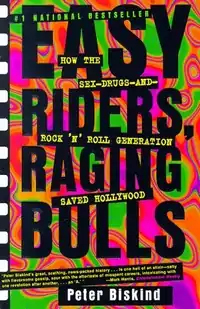Easy Riders, Raging Bulls
Easy Riders, Raging Bulls: How the Sex-Drugs-and-Rock 'N Roll Generation Saved Hollywood is a book by Peter Biskind, published by Simon & Schuster in 1998. Easy Riders, Raging Bulls is about the 1960s and 1970s Hollywood, a period of American film known for the production of such films such as The Godfather, The Godfather Part II, The French Connection, Chinatown, Taxi Driver, Jaws, Star Wars, The Exorcist, and The Last Picture Show. The title is taken from films which bookend the era: Easy Rider (1969) and Raging Bull (1980). The book follows Hollywood on the brink of the Vietnam War, when a group of young Hollywood film directors known as the "movie brats" are making their names. It begins in the 1960s and ends in the 1980s.
 | |
| Author | Peter Biskind |
|---|---|
| Publisher | Simon & Schuster |
Publication date | 1998 |
| ISBN | 978-0684857084 |
The book was the basis of a 2003 documentary film of the same name directed by Kenneth Bowser and narrated by actor William H. Macy. It was screened out of competition at the 2003 Cannes Film Festival.[1] Rotten Tomatoes gives the film a score of 100% based on reviews from 8 critics.[2]
Profiles and interviews
Profiled in the book
- Robert Altman
- Hal Ashby
- Luke Askew
- Gerald Ayres
- Warren Beatty
- Peter Bogdanovich
- Francis Ford Coppola
- Brian De Palma
- Robert Evans
- Peter Fonda
- William Friedkin
- Buck Henry
- Dennis Hopper
- Amy Irving
- George Lucas
- Marcia Lucas
- John Milius
- Jack Nicholson
- Polly Platt
- Bob Rafelson
- Bert Schneider
- Leonard Schrader
- Paul Schrader
- Martin Scorsese
- Cybill Shepherd
- Don Simpson
- Steven Spielberg
- Robert Towne
Interviewed in the film
- Dede Allen
- Peter Bart
- Tony Bill
- Karen Black
- Peter Bogdanovich
- Ellen Burstyn
- Roger Corman
- Micky Dolenz
- Richard Dreyfuss
- Peter Fonda
- Carl Gottlieb
- Jerome Hellman
- Monte Hellman
- Dennis Hopper
- Willard Huyck
- Stanley Jaffe
- Henry Jaglom
- Gloria Katz
- Margot Kidder
- Laszlo Kovacs
- Kris Kristofferson
- Mardik Martin
- Mike Medavoy
- Sylvia Miles
- John Milius
- Charles Mulvehill
- David Newman
- Arthur Penn
- Michael Phillips
- David Picker
- Polly Platt
- Albert S. Ruddy
- Jennifer Salt
- Andrew Sarris
- Paul Schrader
- Cybill Shepherd
- Jonathan Taplin
- Joan Tewkesbury
- Fred Weintraub
- Gordon Willis
- Rudy Wurlitzer
- Vilmos Zsigmond
Controversy and criticism
Several of the film-makers profiled in the book have criticized Biskind. Robert Altman denounced both the book and Biskind's methods, saying "It was hate mail. We were all lured into talking to this guy because people thought he was a straight guy but he was filling a commission from the publisher for a hatchet job. He's the worst kind of human being I know."[3] Francis Ford Coppola was similarly critical, alleging that Biskind interviewed only people with negative opinions of him.[4]
Critic Roger Ebert noted that Steven Spielberg said of Easy Riders, Raging Bulls that: "Every single word in that book about me is either erroneous or a lie."[5] Ebert himself notes that: "Biskind has a way of massaging his stories to suit his agenda."[5] When asked about Biskind's portrayal of him as "a womanizer, a tyrant and a bully," William Friedkin said: "I've actually never read the book, but I've talked to some of my friends who are portrayed in it, and we all share the opinion that it is partial truth, partial myth and partial out-and-out lies by mostly rejected girlfriends and wives."[6] Peter Bogdanovich was equally furious, saying: "I spent seven hours with that guy over a period of days, and he got it all wrong".[7]
In an interview, Biskind stated he found the negative responses "very upsetting," also saying, "in the case of Coppola... he made three great movies, the two Godfathers and The Conversation. His place in film history is secure. If I had made those films, I wouldn’t give a damn what anyone wrote about me." Biskind claims he and Coppola made amends on a cruise in 2000.[8]
See also
A Decade Under the Influence - a 2003 documentary also about New Hollywood.
Further reading
- Biskind, Peter (1998). Easy Riders, Raging Bulls: How the Sex-Drugs-and Rock 'n Roll Generation Saved Hollywood. Simon & Schuster. ISBN 978-0-684-80996-0. OCLC 38389788.(registration required)
References
- "Festival de Cannes: Easy Riders, Raging Bulls". festival-cannes.com. Retrieved 2009-11-08.
- "Easy Riders---Raging Bulls". Rotten Tomatoes.
- Tim Adams (22 August 2004). "Full exposure". The Observer. Archived from the original on 2013-12-03.
- Susan Wloszczyna (July 18, 2014). "'Easy Riders, Raging Bulls' Author Peter Biskind Looks Back at the New Hollywood". IndieWire. Retrieved August 3, 2017.
- Roger Ebert (February 22, 2004). "TINSELTOWN AUTHOR GETS 'DOWN AND DIRTY,' INDEED". Rogerebert.com. Retrieved August 3, 2017.
- Paul Teetor (April 11, 2013). "The Exorcist Director William Friedkin Tells All in His No-Bullshit Memoir". LA Weekly. Retrieved August 3, 2017.
- David Poland (February 14, 2006). "Bogdanovich Epilogue: A Word About Biskind And Cher". Movie City News. Retrieved August 3, 2017.
- Susan Wloszczyna (July 18, 2014). "'Easy Riders, Raging Bulls' Author Peter Biskind Looks Back at the New Hollywood". IndieWire. Retrieved August 24, 2022.